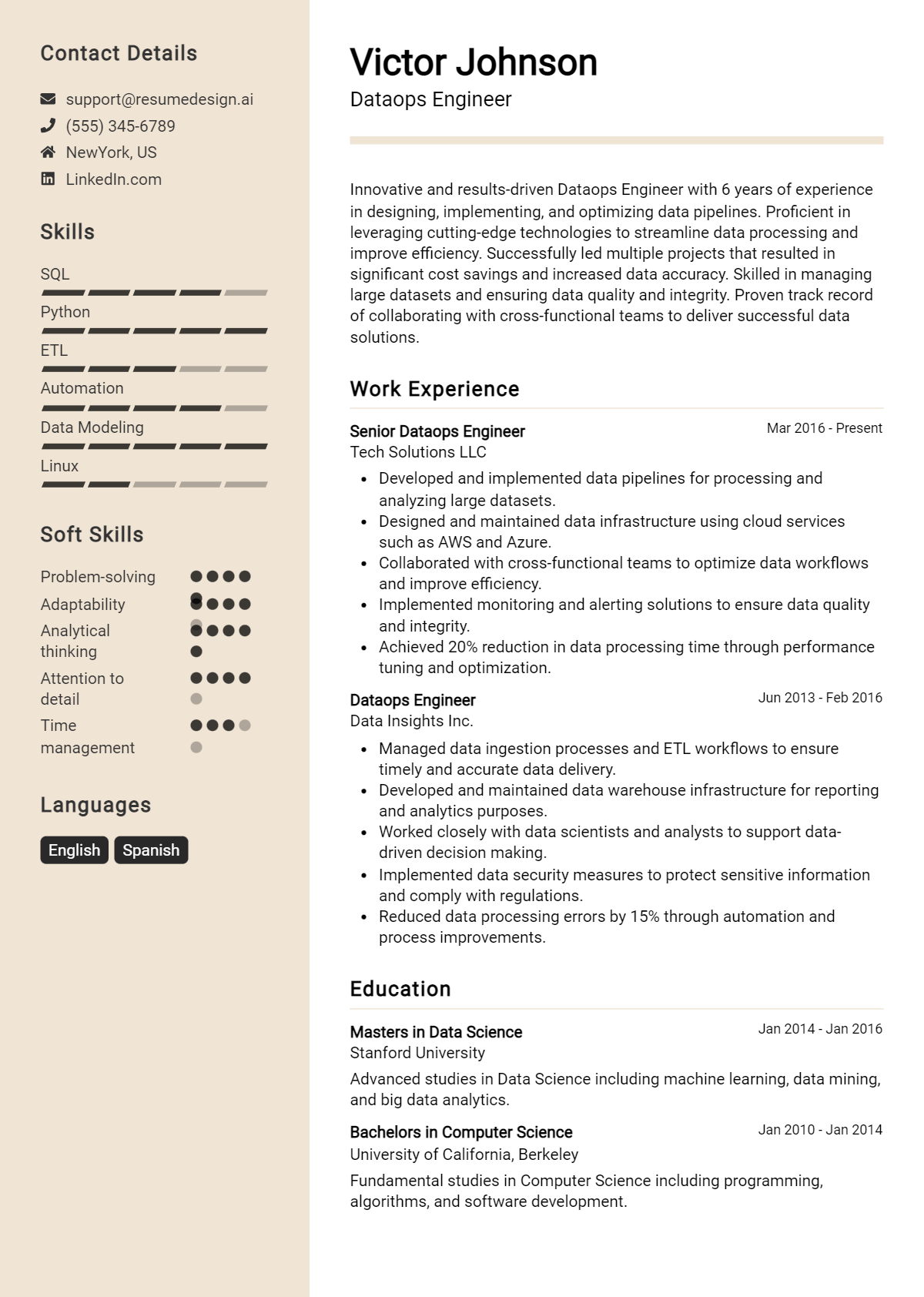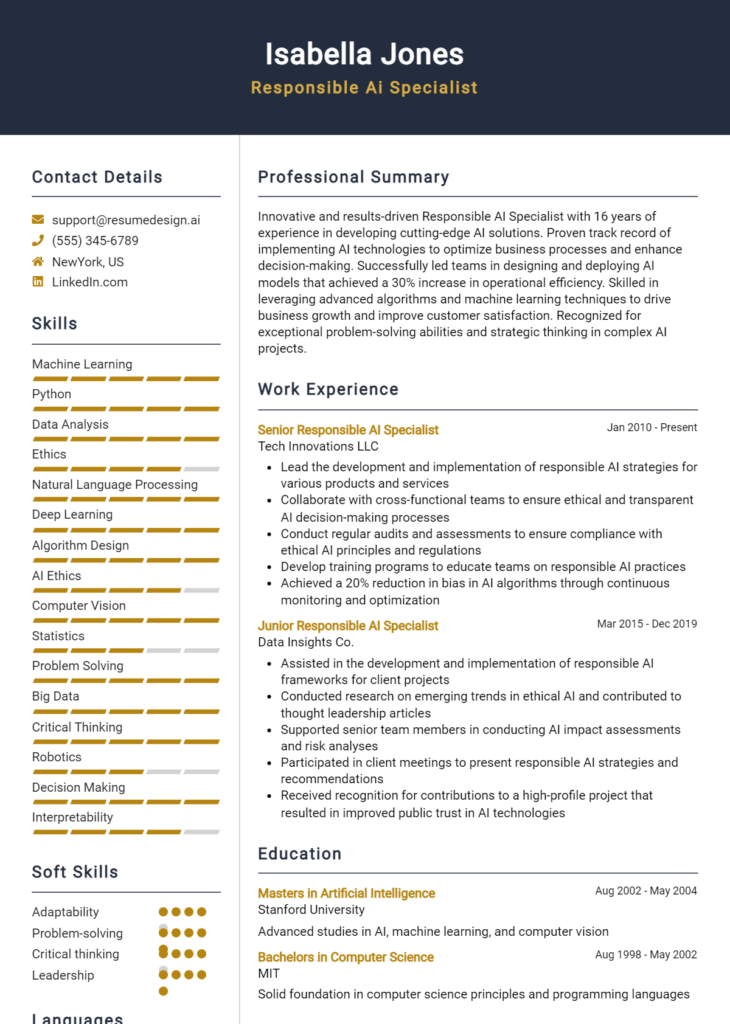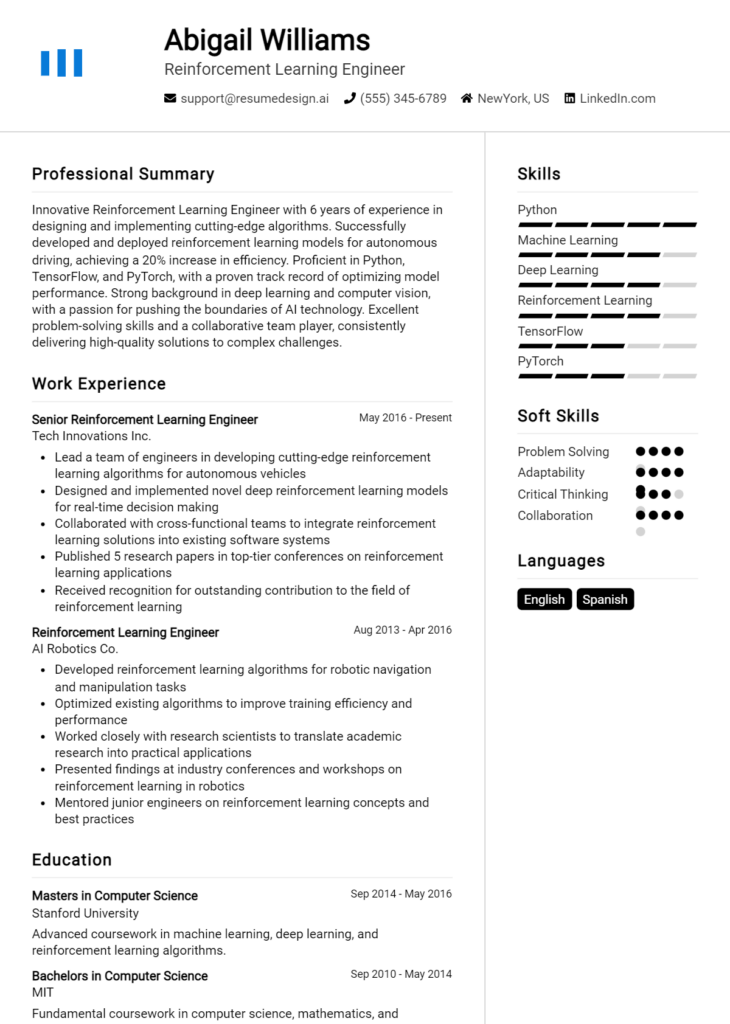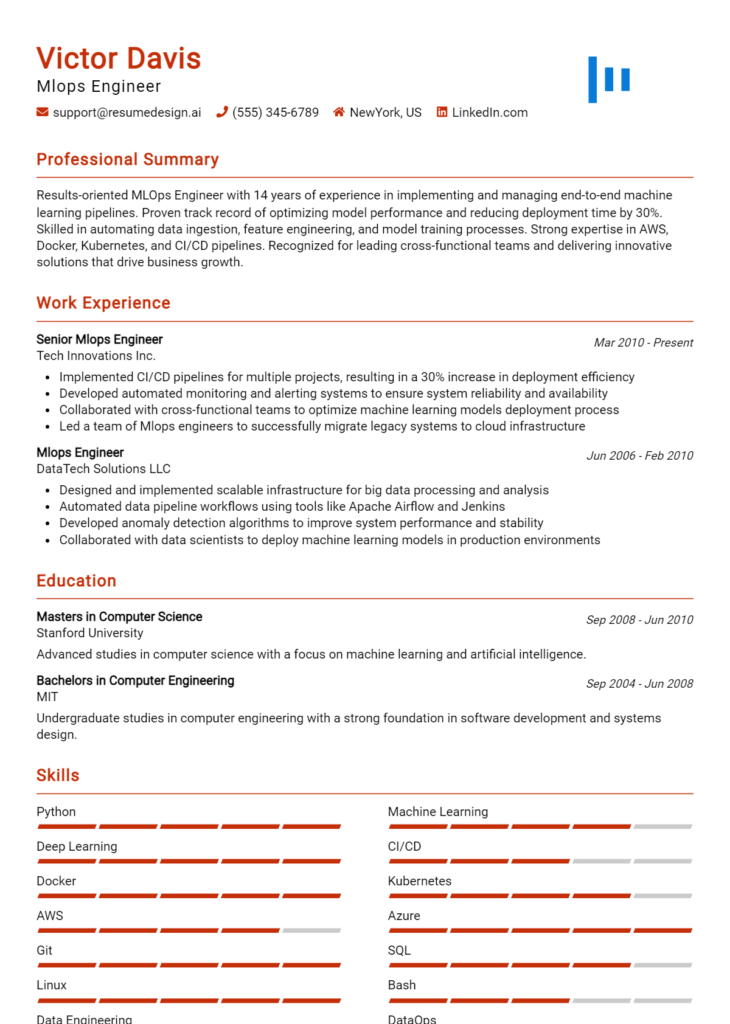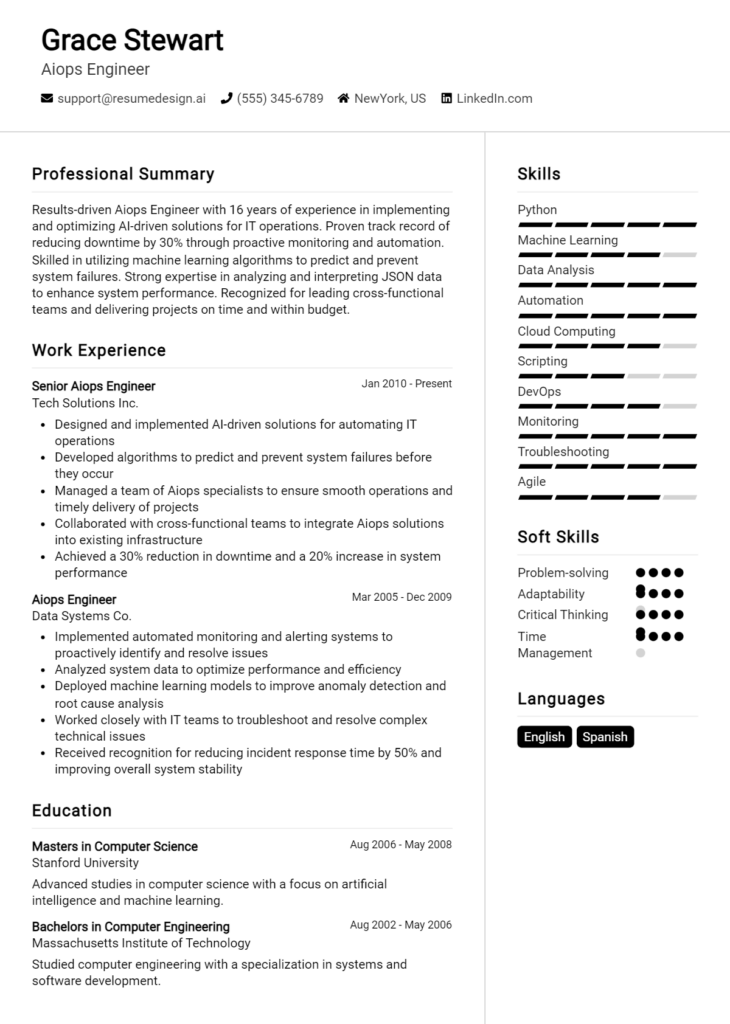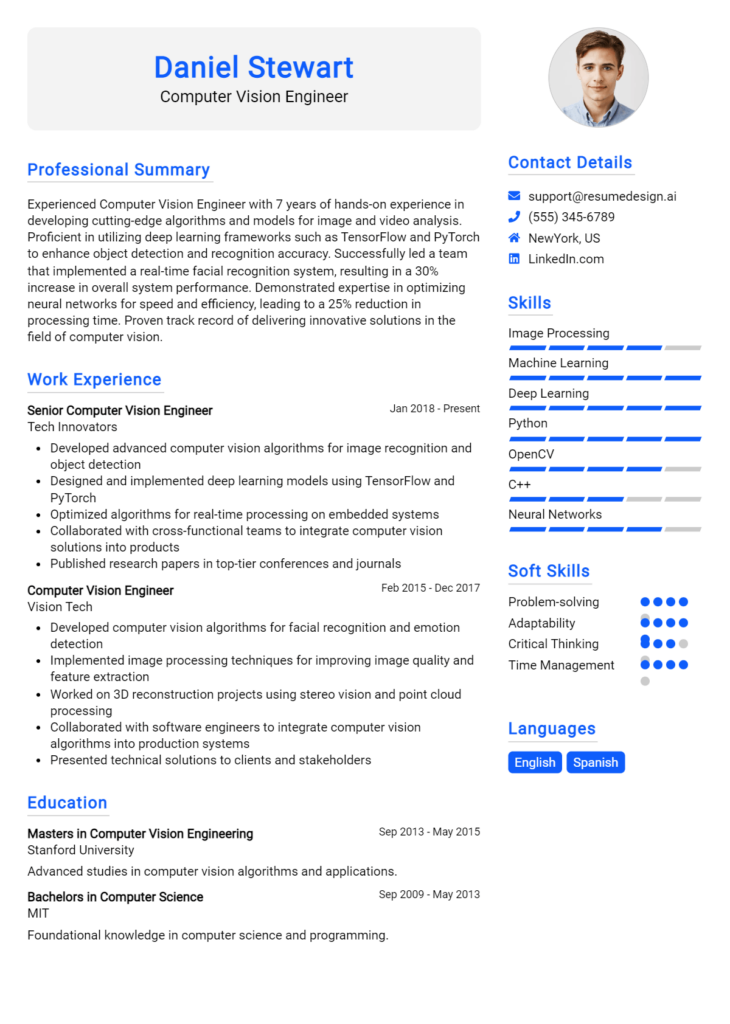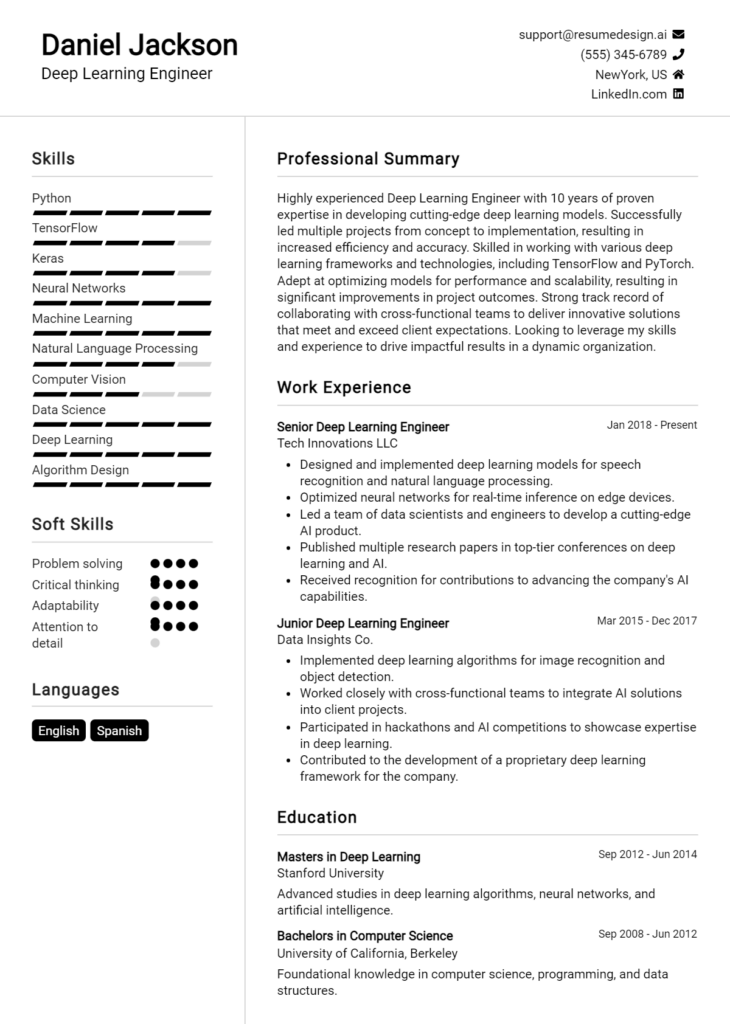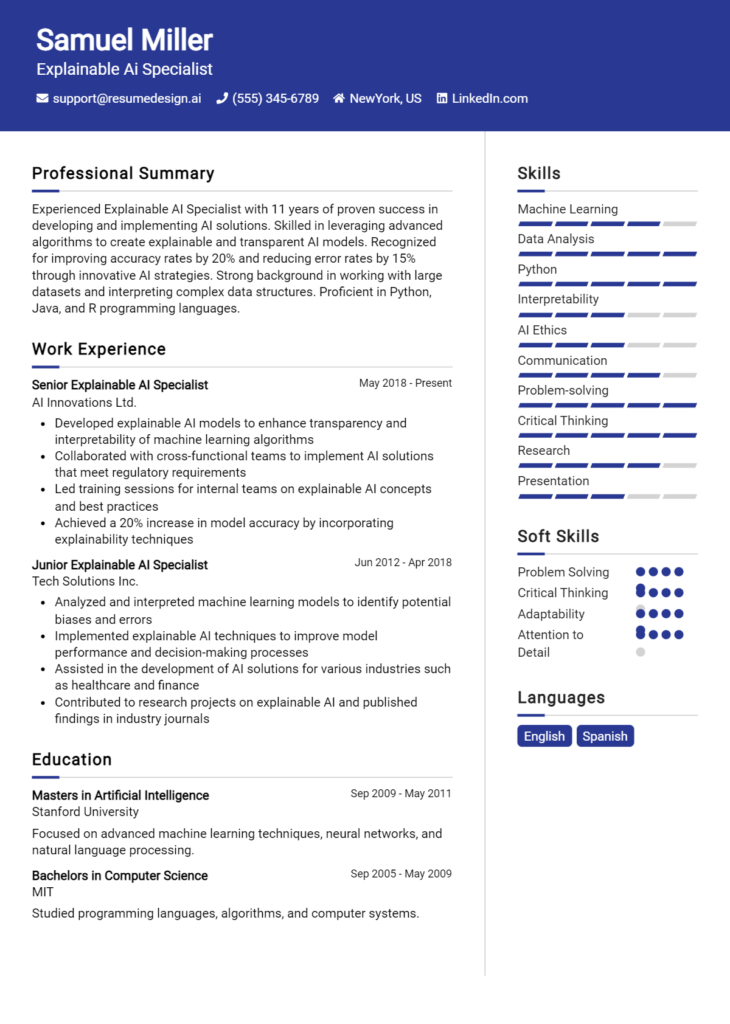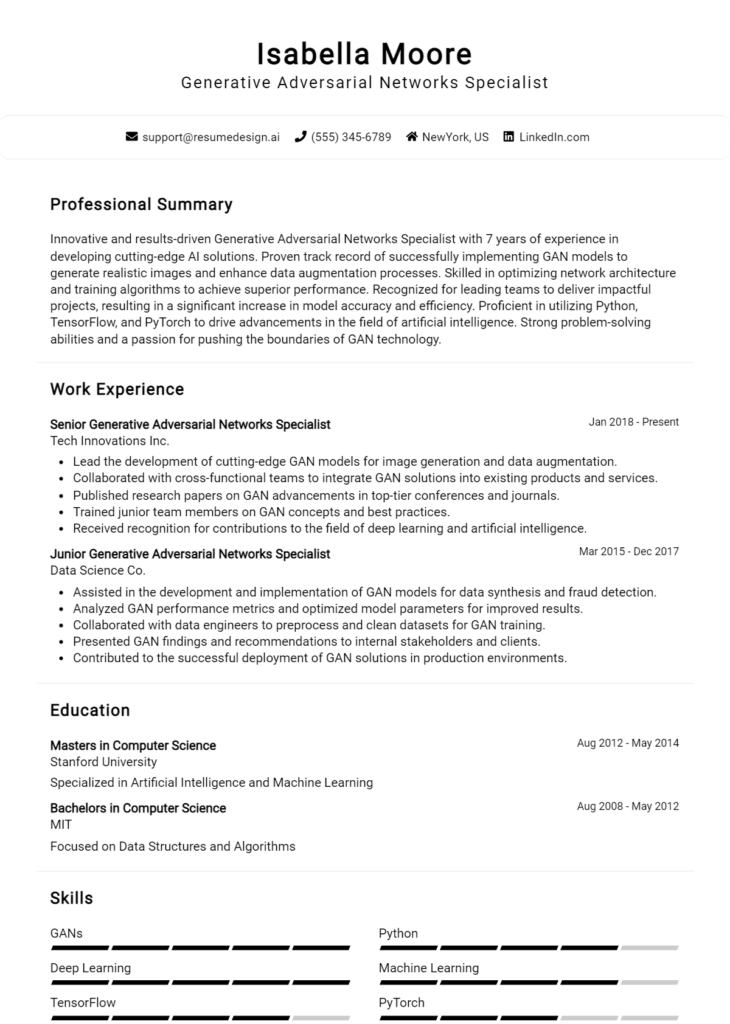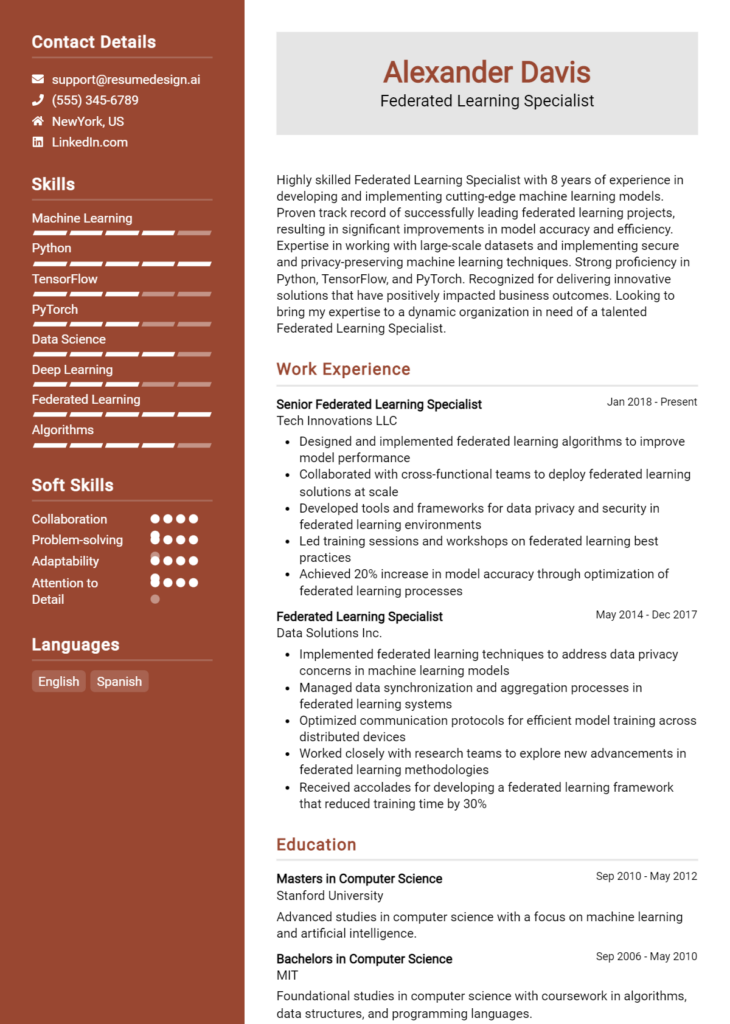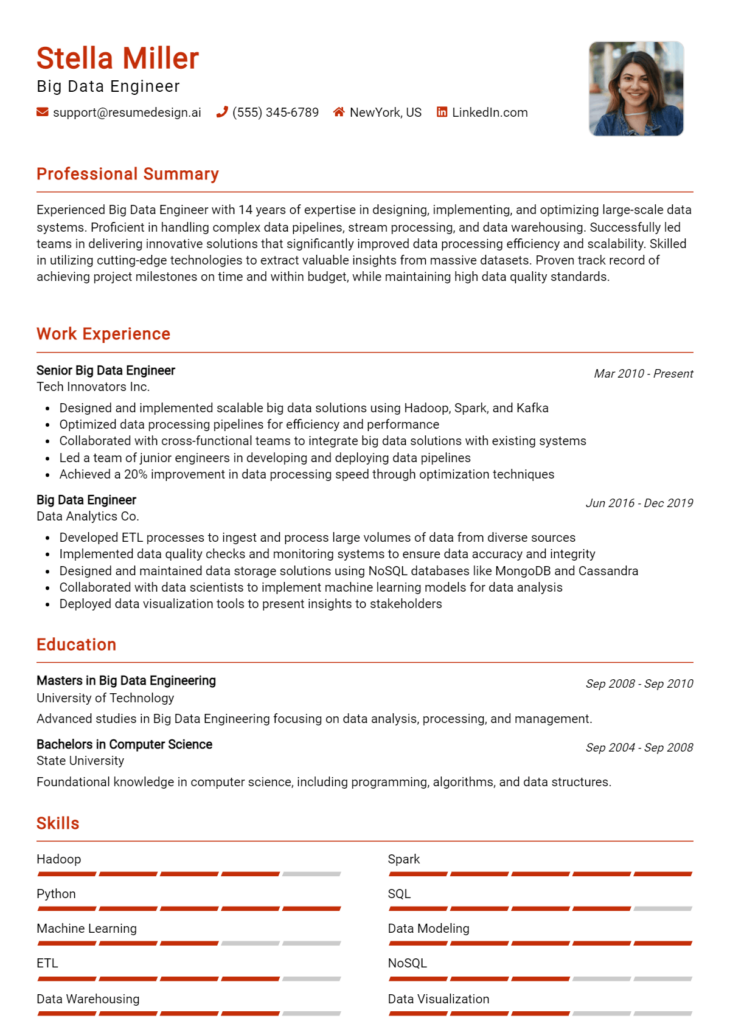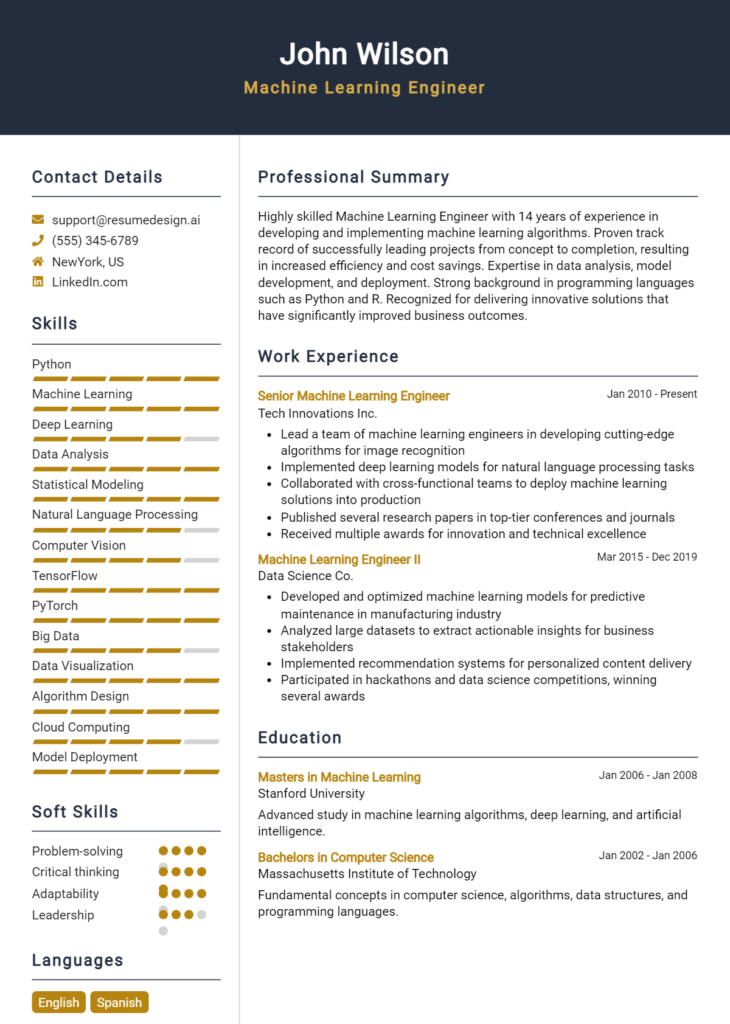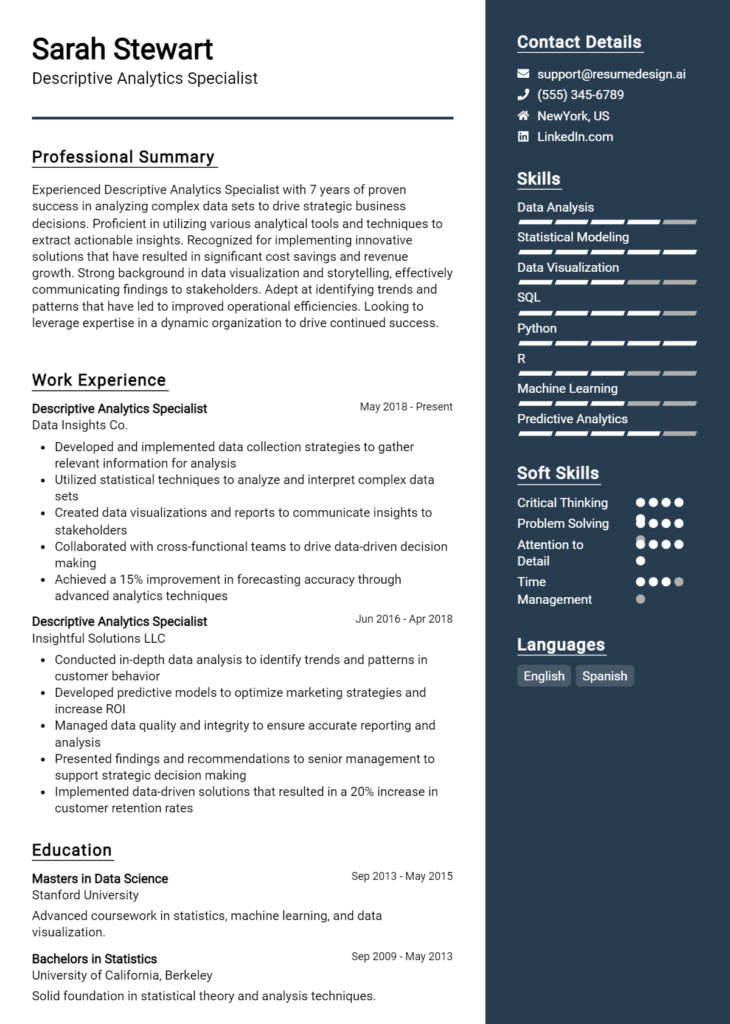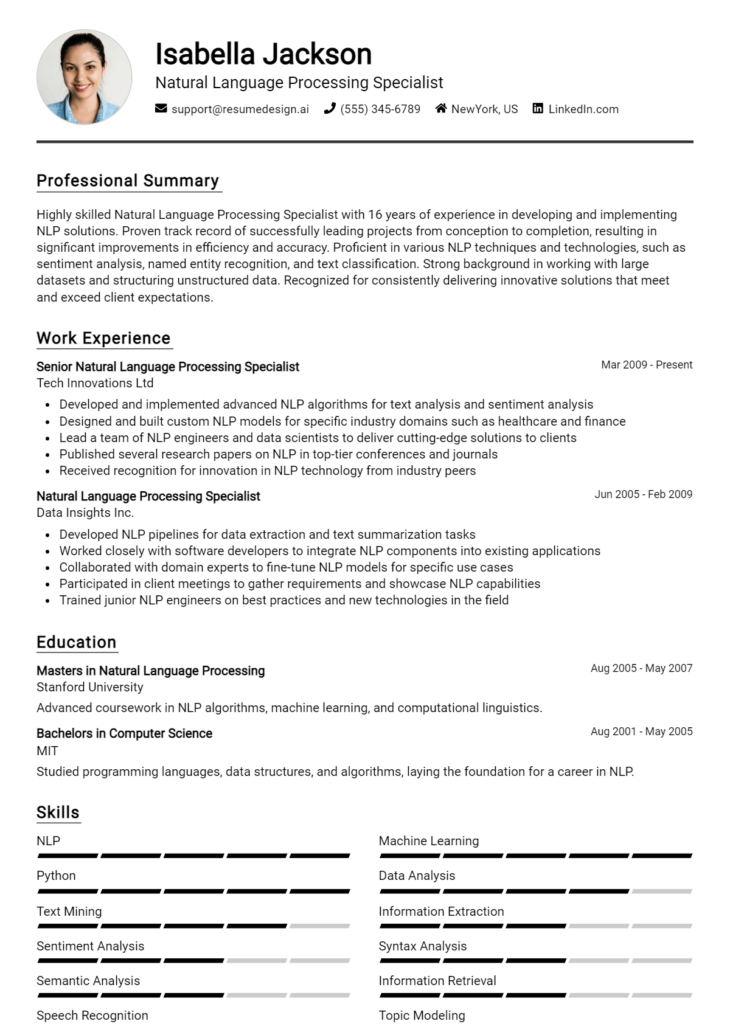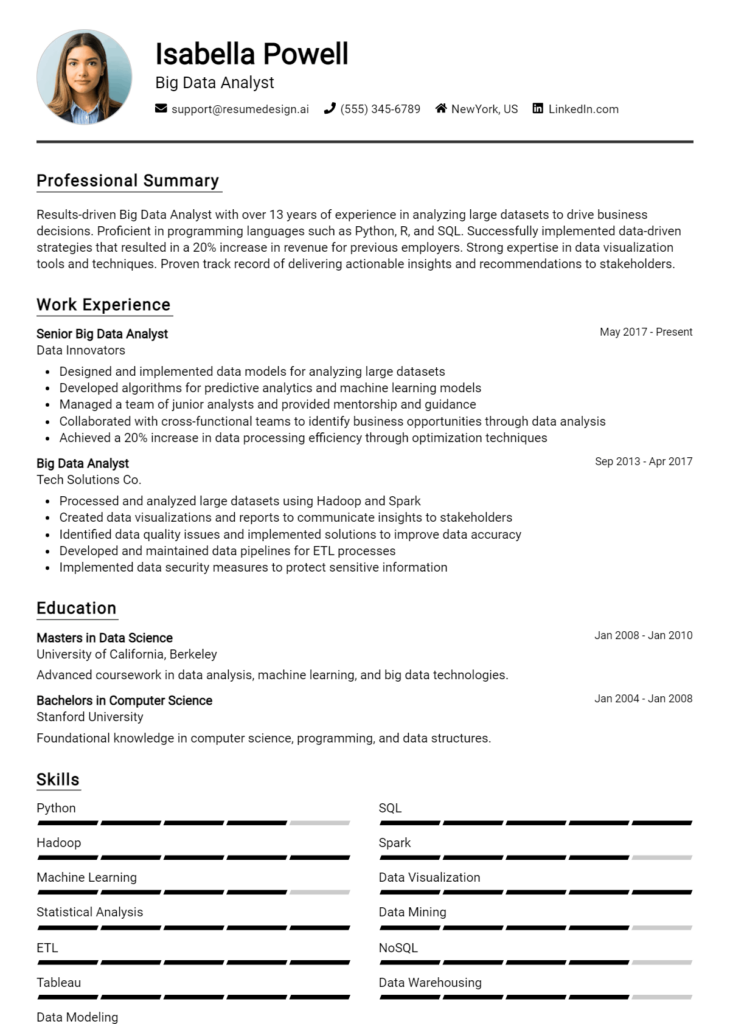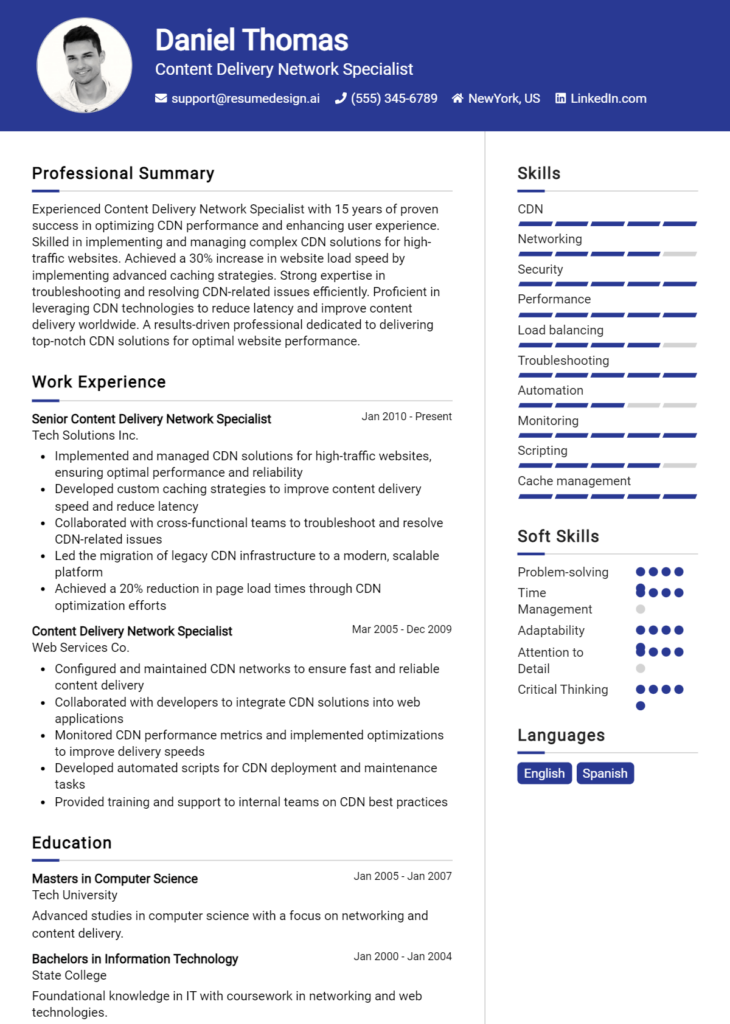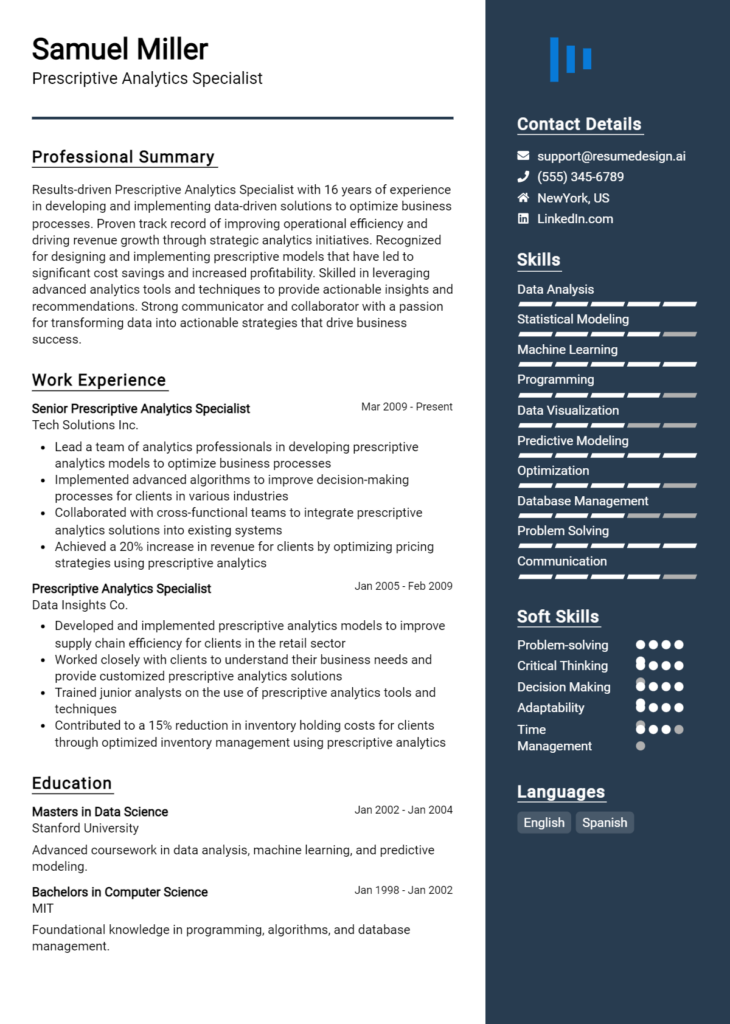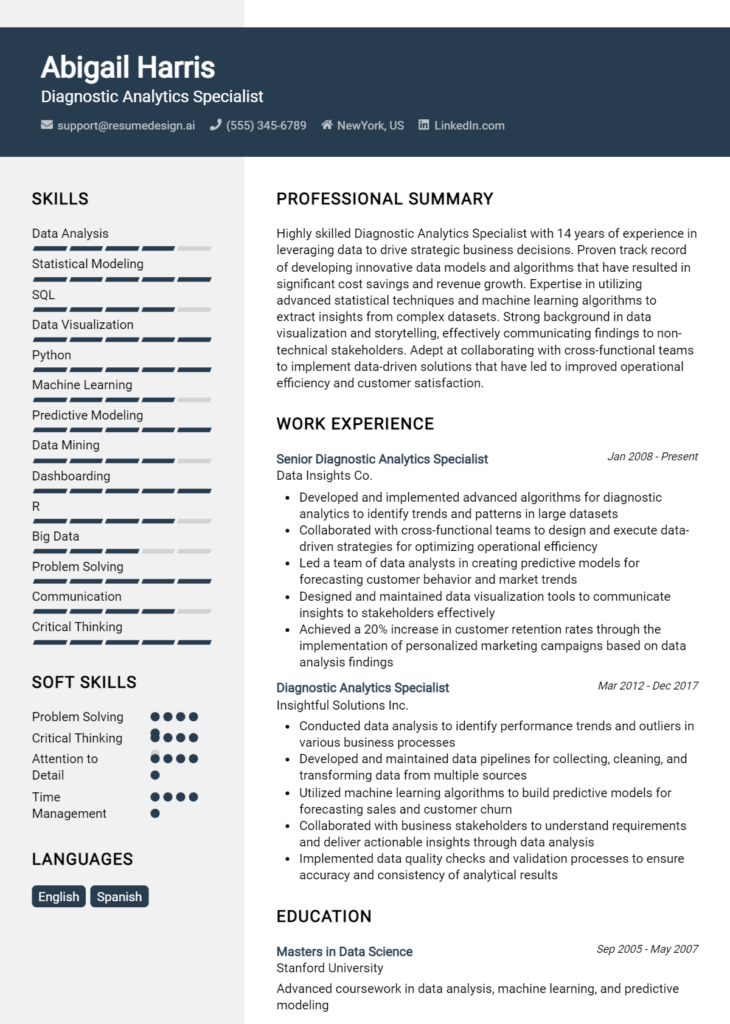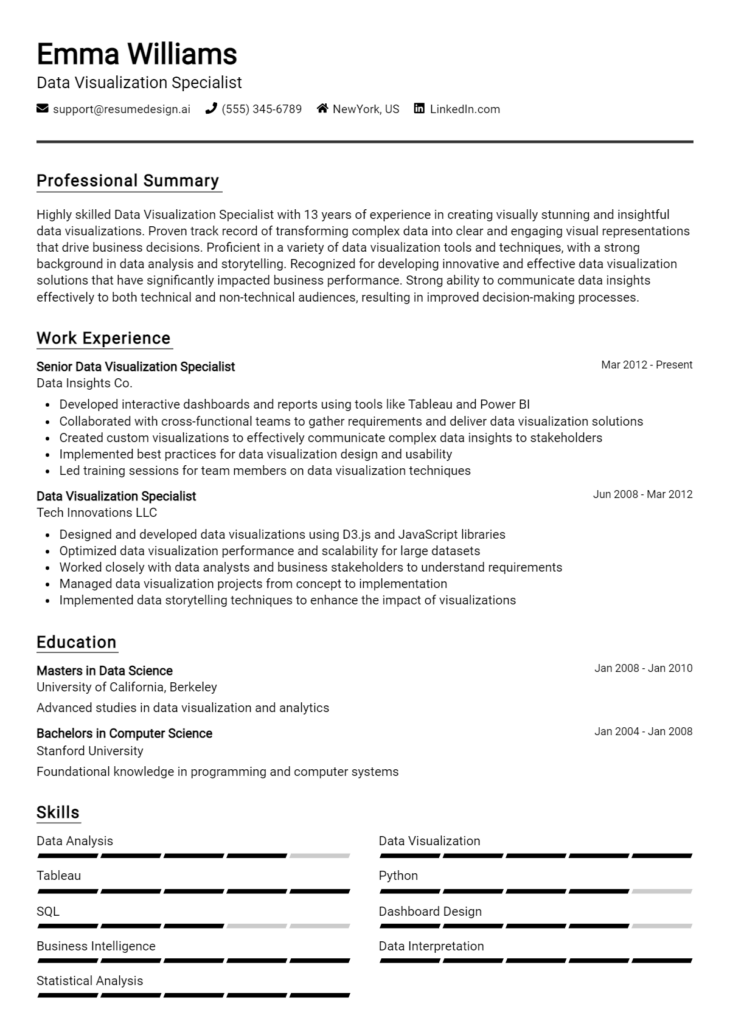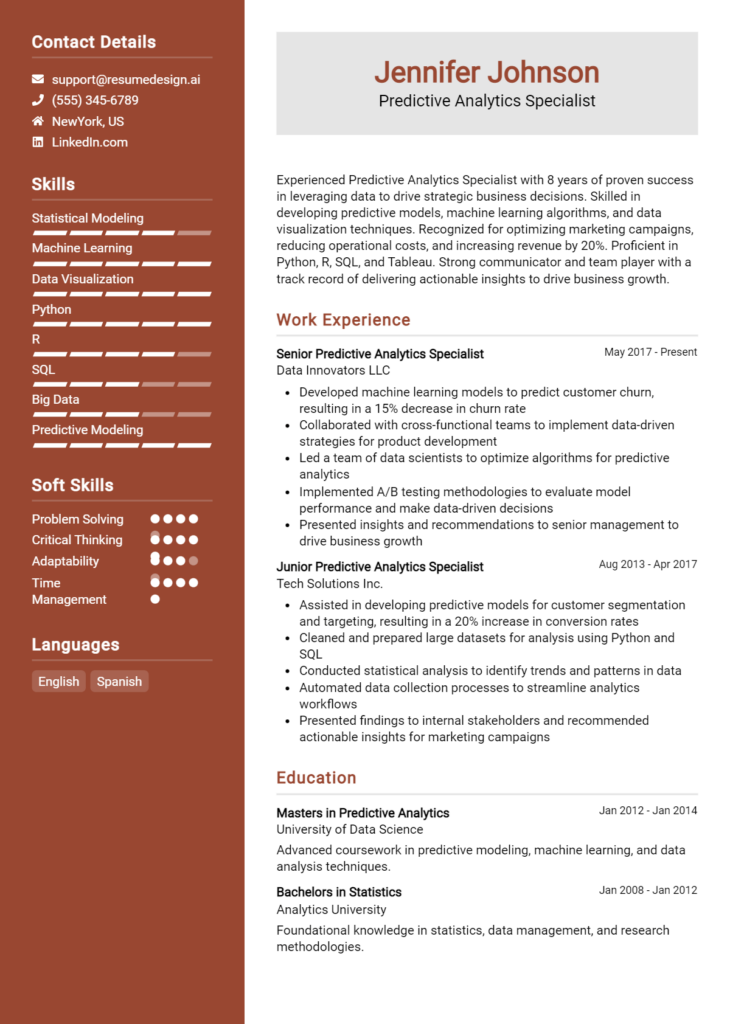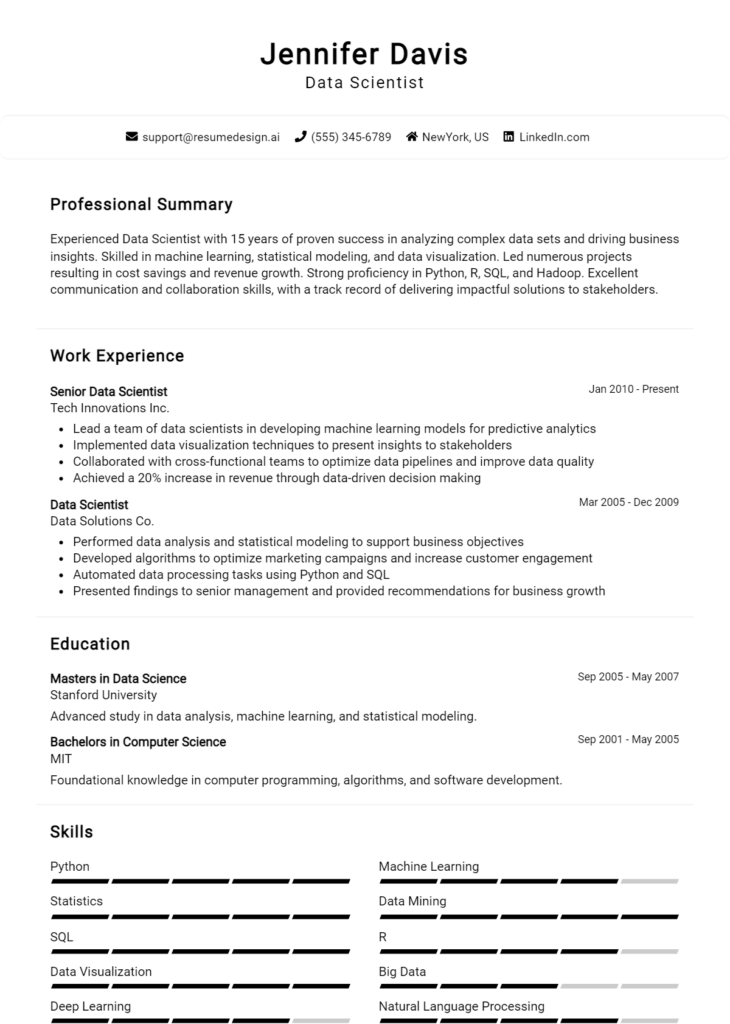DataOps Engineer Core Responsibilities
A DataOps Engineer plays a crucial role in bridging data management and operational processes across various departments. They are responsible for optimizing data pipelines, ensuring data quality, and automating workflows to enhance collaboration between data scientists, IT, and business teams. Key skills include technical proficiency in data integration tools, operational knowledge of data governance, and strong problem-solving abilities. These competencies are vital for achieving the organization’s data-driven goals, making a well-structured resume essential to highlight these qualifications effectively.
Common Responsibilities Listed on DataOps Engineer Resume
- Design and implement automated data pipelines and workflows.
- Collaborate with data scientists and analysts to streamline data access.
- Ensure data quality and integrity through monitoring and validation processes.
- Manage and optimize data storage solutions.
- Develop and enforce data governance and compliance policies.
- Utilize tools like Apache Airflow and Kubernetes for orchestration.
- Provide support for data infrastructure and architecture improvements.
- Conduct performance tuning and troubleshooting of data systems.
- Document processes and maintain data lineage for transparency.
- Facilitate cross-functional training on data tools and practices.
- Collaborate with DevOps teams to integrate data operations with CI/CD pipelines.
High-Level Resume Tips for DataOps Engineer Professionals
In today's competitive job market, a well-crafted resume is essential for DataOps Engineer professionals striving to make a strong first impression on potential employers. Your resume is often the gateway to new opportunities, reflecting not only your technical skills but also your achievements and contributions in the field. A compelling resume can differentiate you from other candidates, showcasing your unique qualifications and experiences that align with the specific needs of the role. This guide will provide practical and actionable resume tips specifically tailored for DataOps Engineer professionals, helping you to create a standout document that captures the attention of hiring managers.
Top Resume Tips for DataOps Engineer Professionals
- Tailor your resume for each job application by closely matching your skills and experiences to the job description.
- Highlight relevant experience in data management, engineering, and operations to demonstrate your expertise.
- Quantify your achievements, using metrics to illustrate the impact of your work (e.g., improved data processing time by 30%).
- Include industry-specific skills such as knowledge of cloud platforms, data pipeline tools, and CI/CD practices.
- Showcase your proficiency in programming languages commonly used in DataOps, such as Python, SQL, and R.
- Emphasize experience with data governance, compliance, and security measures to demonstrate a holistic understanding of data management.
- List certifications and professional development courses relevant to DataOps to enhance your qualifications.
- Incorporate soft skills like collaboration, communication, and problem-solving, which are crucial in DataOps environments.
- Use a clean, professional format that makes your resume easy to read and visually appealing.
By implementing these tips, DataOps Engineer professionals can significantly increase their chances of landing a job in this thriving field. A well-structured and targeted resume not only highlights your qualifications but also positions you as a strong candidate who understands the specific demands of the role. With the right approach, you can make your resume work for you, paving the way for exciting career opportunities in DataOps.
Why Resume Headlines & Titles are Important for DataOps Engineer
In the competitive landscape of data-driven roles, a well-crafted resume headline or title serves as a critical first impression for DataOps Engineers. It acts as a powerful hook that captures the attention of hiring managers, succinctly summarizing a candidate's key qualifications and unique value proposition in a single impactful phrase. A strong headline not only conveys relevant skills and experiences but also aligns directly with the specific job being applied for, ensuring that candidates stand out in a sea of applicants. As such, creating a concise and relevant headline is essential for making a lasting impression and increasing the likelihood of progressing to the next stage of the hiring process.
Best Practices for Crafting Resume Headlines for DataOps Engineer
- Keep it concise; aim for a single impactful sentence.
- Make it role-specific; include the title “DataOps Engineer” to clarify your focus.
- Highlight key skills or technologies relevant to DataOps.
- Use action words to convey your achievements or contributions.
- Incorporate relevant certifications or degrees where applicable.
- Tailor your headline to the specific job description you are applying for.
- Avoid jargon; ensure clarity and accessibility for non-technical readers.
- Consider including metrics or results to showcase impact.
Example Resume Headlines for DataOps Engineer
Strong Resume Headlines
"Results-Driven DataOps Engineer Specializing in Continuous Integration and Deployment"
"DataOps Engineer with 5+ Years of Experience in Big Data Solutions and Automation"
"Innovative DataOps Engineer Focused on Optimizing Data Pipelines and Reducing Time to Insights"
Weak Resume Headlines
“Engineer Looking for Work”
“Data Professional”
Strong resume headlines are effective because they immediately communicate the candidate's expertise and relevance to the DataOps role, making them more memorable and engaging to hiring managers. They utilize specific language that highlights key skills and achievements, which helps to create a compelling narrative about the candidate's qualifications. In contrast, weak headlines fail to impress due to their vagueness and lack of specificity; they do not provide any insight into the candidate's unique strengths or how they align with the job, making them easily forgettable in a crowded job market.
Writing an Exceptional DataOps Engineer Resume Summary
A resume summary is a critical component for a DataOps Engineer as it serves as the first impression for hiring managers, encapsulating the candidate's key skills, experiences, and accomplishments in a concise format. An exceptional summary quickly captures attention, demonstrating a clear understanding of the role and the specific qualifications that align with it. By being impactful and tailored to the job description, a well-crafted summary can set a candidate apart from the competition, making it easier for hiring managers to see the potential value they would bring to the organization.
Best Practices for Writing a DataOps Engineer Resume Summary
- Quantify achievements: Use numbers to highlight the impact of your work, such as project completions or efficiency improvements.
- Focus on relevant skills: Emphasize technical skills such as data integration, automation, and cloud technologies that are pertinent to DataOps.
- Tailor for the job description: Customize your summary to reflect the specific requirements and responsibilities listed in the job posting.
- Keep it concise: Aim for 3-5 sentences that clearly articulate your value without overwhelming the reader.
- Use action verbs: Start with strong verbs to convey your contributions and achievements effectively.
- Highlight relevant experience: Mention specific roles or projects that directly relate to DataOps practices.
- Showcase soft skills: Include interpersonal skills such as collaboration and communication that complement technical abilities.
Example DataOps Engineer Resume Summaries
Strong Resume Summaries
Results-driven DataOps Engineer with over 5 years of experience in automating data pipelines, resulting in a 40% increase in data processing efficiency. Proficient in utilizing tools such as Apache Airflow and Kubernetes to streamline workflows and enhance data quality.
Dynamic DataOps Engineer skilled in deploying CI/CD practices within cloud environments, contributing to a 30% reduction in deployment time for data applications. Adept at collaborating with cross-functional teams to align data strategies with business goals.
Detail-oriented DataOps professional with a track record of implementing data governance frameworks, leading to a 25% improvement in data accuracy. Expertise in Python and SQL, with a passion for transforming raw data into actionable insights.
Weak Resume Summaries
Experienced engineer with a background in data. Looking for opportunities in DataOps.
DataOps Engineer with knowledge of various tools and technologies. Excited to contribute to a team.
The examples of strong resume summaries effectively highlight specific achievements, quantify results, and demonstrate a direct relevance to the DataOps role. They utilize impactful language and present clear evidence of the candidate’s ability to deliver value. Conversely, the weak summaries lack specificity and clarity, making them less memorable and failing to convey the candidate's unique qualifications or the impact they have made in previous roles.
Work Experience Section for DataOps Engineer Resume
The work experience section of a DataOps Engineer resume is crucial as it serves as a platform for candidates to demonstrate their technical expertise, team management abilities, and commitment to delivering high-quality products. Through this section, potential employers can evaluate how a candidate's past roles align with the demands of the DataOps landscape. It is essential to quantify achievements, such as improvements in data processing times or successful project completions, to provide concrete evidence of capabilities. Furthermore, aligning experiences with industry standards and best practices enhances the candidate's appeal and allows for a clearer understanding of their contributions to previous organizations.
Best Practices for DataOps Engineer Work Experience
- Highlight specific tools and technologies used, such as Apache Kafka, Hadoop, or Kubernetes.
- Quantify results with metrics (e.g., reduced processing time by 30%, improved data accuracy by 25%).
- Showcase leadership by detailing team projects and your role in driving success.
- Include industry-standard methodologies like Agile or DevOps in your descriptions.
- Emphasize collaboration with cross-functional teams, such as data scientists and business analysts.
- Document any certifications or training that back your technical skills.
- Tailor your experiences to align with the specific job description and requirements.
- Use action verbs to convey a sense of initiative and impact (e.g., implemented, designed, optimized).
Example Work Experiences for DataOps Engineer
Strong Experiences
- Led a team of 5 engineers to implement a real-time data processing pipeline, resulting in a 40% reduction in data latency for critical business insights.
- Designed and deployed a data governance framework that improved data quality across the organization, achieving a 25% increase in data accuracy metrics.
- Collaborated with data scientists to optimize machine learning models, resulting in a 30% increase in predictive accuracy and a 15% reduction in model training time.
- Implemented CI/CD practices that decreased deployment times from hours to minutes, significantly enhancing the team’s productivity and responsiveness to business needs.
Weak Experiences
- Worked on data projects that involved various technologies.
- Helped in improving data processes without specific metrics or outcomes.
- Participated in team meetings and discussions regarding data initiatives.
- Assisted in maintaining data systems with no clear impact or results stated.
The examples listed above illustrate the key differences between strong and weak experiences in a DataOps Engineer resume. Strong experiences provide specific results, showcase leadership, and highlight collaboration with measurable outcomes, which effectively demonstrate a candidate's capabilities. In contrast, weak experiences lack specificity, measurable achievements, and clarity, making it difficult for employers to gauge the candidate's true impact and value in their previous roles.
Education and Certifications Section for DataOps Engineer Resume
The education and certifications section of a DataOps Engineer resume is crucial for showcasing a candidate's academic qualifications, industry-relevant certifications, and commitment to continuous learning. This section not only reflects the candidate's foundational knowledge in data management and engineering but also emphasizes their dedication to staying updated with the latest tools and methodologies in the evolving field of DataOps. By providing pertinent coursework, recognized certifications, and specialized training, candidates can significantly enhance their credibility and demonstrate their alignment with the specific requirements of the job role.
Best Practices for DataOps Engineer Education and Certifications
- Focus on relevant degrees, such as Computer Science, Data Science, or Information Technology.
- Highlight industry-recognized certifications like AWS Certified Data Analytics or Google Professional Data Engineer.
- Include specific coursework that aligns with DataOps methodologies, such as data pipeline design or data governance.
- List any specialized training programs that cover tools commonly used in DataOps, such as Apache Kafka or Kubernetes.
- Prioritize recent educational experiences to reflect current knowledge and skills.
- Use a clear format that allows hiring managers to easily identify key credentials and achievements.
- Consider including online courses from reputable platforms that showcase continuous learning.
- Be concise but detailed enough to convey the significance of each certification or course.
Example Education and Certifications for DataOps Engineer
Strong Examples
- Bachelor of Science in Computer Science, University of California, 2020
- AWS Certified Data Analytics – Specialty, 2021
- DataOps Fundamentals Certification, DataOps Institute, 2022
- Advanced SQL for Data Science, Coursera, 2023
Weak Examples
- Associate Degree in Fine Arts, Community College, 2019
- Certified Microsoft Office Specialist, 2018
- Basic HTML and CSS Training, 2017
- High School Diploma, 2015
The strong examples are considered effective because they showcase relevant academic backgrounds and recent industry certifications that align well with the DataOps Engineer role. They demonstrate not only foundational knowledge but also specialized skills that are highly sought after in the industry. Conversely, the weak examples highlight qualifications that are either outdated or unrelated to the field of DataOps, failing to provide any substantial value to a resume targeting this specific role. This contrast emphasizes the importance of relevance and currency in educational and certification achievements.
Top Skills & Keywords for DataOps Engineer Resume
As a DataOps Engineer, showcasing the right skills on your resume is crucial for standing out in a competitive job market. Employers are increasingly seeking candidates who not only possess technical expertise but also demonstrate soft skills that enhance teamwork and collaboration. A well-crafted resume that highlights these skills can significantly increase your chances of landing interviews. By effectively combining both hard and soft skills, you can present a comprehensive picture of your capabilities, making you an attractive candidate for DataOps roles. For those looking to refine their resumes, it’s essential to focus on both skills and work experience that align with industry standards.
Top Hard & Soft Skills for DataOps Engineer
Soft Skills
- Effective communication
- Problem-solving abilities
- Collaboration and teamwork
- Adaptability
- Critical thinking
- Attention to detail
- Time management
- Leadership
- Creativity
- Conflict resolution
Hard Skills
- Proficiency in data pipeline tools (e.g., Apache NiFi, Airflow)
- Experience with cloud platforms (e.g., AWS, Azure, Google Cloud)
- Familiarity with containerization technologies (e.g., Docker, Kubernetes)
- Knowledge of programming languages (e.g., Python, SQL, Scala)
- Understanding of CI/CD processes
- Data modeling and architecture
- Experience with data warehousing solutions (e.g., Snowflake, Redshift)
- Proficiency in data visualization tools (e.g., Tableau, Power BI)
- Knowledge of data governance and compliance
- Familiarity with machine learning concepts and tools
Stand Out with a Winning DataOps Engineer Cover Letter
Dear Hiring Manager,
I am writing to express my interest in the DataOps Engineer position at [Company Name] as advertised on [Where You Found the Job Listing]. With a robust background in data engineering, cloud computing, and agile methodologies, I am excited about the opportunity to contribute to your team and help streamline data operations to enhance data-driven decision-making across the organization. My experience in developing and maintaining data pipelines, along with my commitment to fostering a collaborative culture, aligns perfectly with the goals of your DataOps team.
In my previous role at [Previous Company Name], I successfully implemented an automated data pipeline that reduced data processing time by 30%. This was achieved through the integration of modern data orchestration tools and the adoption of continuous integration and deployment practices. My expertise in cloud platforms such as AWS and Azure, combined with my proficiency in programming languages like Python and SQL, has equipped me with the technical skills necessary to design scalable data solutions. Additionally, my experience working closely with data scientists and analysts has honed my ability to translate complex data requirements into actionable insights.
I am particularly drawn to [Company Name] because of your commitment to innovation and excellence in data management. I admire your use of cutting-edge technologies and your focus on creating a culture that values collaboration and continuous improvement. I am eager to bring my skills in data governance, quality assurance, and cross-functional teamwork to your organization, ensuring that data integrity and availability are upheld at every stage of the data lifecycle.
Thank you for considering my application. I am enthusiastic about the opportunity to discuss how my experience and vision align with the objectives of your DataOps team. I look forward to the possibility of contributing to [Company Name] and driving impactful data solutions together.
Sincerely,
[Your Name]
[Your LinkedIn Profile]
[Your Contact Information]
Common Mistakes to Avoid in a DataOps Engineer Resume
When crafting a resume for a DataOps Engineer position, it's essential to avoid common pitfalls that can undermine the effectiveness of your application. A well-structured resume should highlight your skills, experience, and achievements in a way that resonates with hiring managers. However, many candidates make mistakes that can detract from their qualifications. Below are some common mistakes to avoid when preparing your DataOps Engineer resume:
Vague Job Descriptions: Failing to provide specific examples of your responsibilities and achievements can make your experience seem less impactful. Use quantifiable metrics to illustrate your contributions.
Ignoring Relevant Skills: Not tailoring your skills section to include relevant DataOps tools and methodologies may result in missed opportunities. Be sure to list skills like CI/CD, data pipeline frameworks, and cloud technologies.
Overloading with Technical Jargon: While technical skills are crucial, excessive jargon can make your resume difficult to read. Aim for clarity and ensure that your language is accessible to both technical and non-technical recruiters.
Neglecting Soft Skills: DataOps requires collaboration and communication. Focusing solely on technical abilities without mentioning soft skills may give the impression that you lack the interpersonal skills necessary for teamwork.
Inconsistent Formatting: A cluttered or inconsistent resume can be off-putting to hiring managers. Use clear headings, bullet points, and a consistent font style throughout your document for better readability.
Including Irrelevant Experience: Listing jobs or experiences that do not relate to DataOps can dilute your resume's impact. Focus on roles that demonstrate your expertise in data management, analytics, and DevOps processes.
Failing to Highlight Achievements: Simply listing duties does not showcase your capabilities. Instead, emphasize your accomplishments and the value you brought to previous roles, such as successful project completions or efficiency improvements.
Not Updating the Resume: An outdated resume can reflect poorly on your professionalism. Regularly update your resume to include new skills, certifications, and experiences to ensure it accurately represents your current qualifications.
Conclusion
As we've explored the essential functions and skills of a DataOps Engineer, it's clear that this role is crucial in bridging the gap between data management and operations. Key responsibilities include ensuring data quality, optimizing data pipelines, and facilitating collaboration among cross-functional teams. Moreover, proficiency in tools like Apache Kafka, Kubernetes, and cloud platforms is increasingly demanded in the industry.
Additionally, as businesses continue to prioritize data-driven decision-making, the need for skilled DataOps Engineers is on the rise. This trend presents a wealth of career opportunities for professionals looking to enhance their skill set and advance their careers.
To make the most of these opportunities, it's crucial to have a standout resume that effectively showcases your expertise and experience in DataOps. We encourage you to take the time to review and update your DataOps Engineer resume to align with industry standards and expectations.
Utilize resources available to you, such as resume templates, a user-friendly resume builder, and resume examples to craft a compelling document that highlights your qualifications. Don't forget to consider cover letter templates that can accompany your resume to further strengthen your application. Start your journey toward a more impactful resume today!

